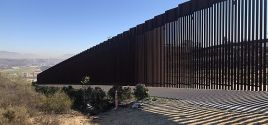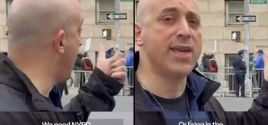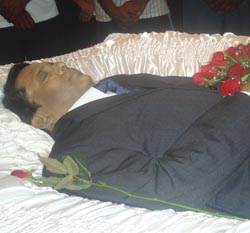The price of media freedom is deathBy Dilrukshi Handunnetti, The Sunday LeaderJan. 17, 2009 |
Popular 
'Sniper Seen on Roof Overlooking Pro-Palestine Protest' at Indiana University

Mike Johnson Pushes Debunked Lie That Israeli Babies Were 'Cooked in Ovens' On October 7

Axios Poll: Majority of Americans Now Want Mass Deportations

Claim Jewish Student Was 'Stabbed In The Eye' by Pro-Palestine Protester Draws Mockery After Video Released

ADL Urged Congress to Pass FISA Law Spying on Americans to 'Protect Israel'
  Everyone's worried about stopping terrorism. Well, there's a really easy way. Stop participating in it. - Chomsky Everyone's worried about stopping terrorism. Well, there's a really easy way. Stop participating in it. - Chomsky Pictured: Lasantha — paid the supreme price fighting for the right for people to know the truth The year 2009 was doomed from the beginning. The shadows of 2008 in which the media practitioners of this country suffered immense hardships under the jackboots of the present day administration and its military apparatus cast its ugly dark shadow on this year as well. Just on to the 8th day of the new year, Sri Lanka scored a dubious first. The internationally renowned editor of The Sunday Leader was gunned down in broad daylight. Needless to say what the plight of the average journalist of this country would be, as the reward for choosing a pen or a camera in this land of barbarians is now to have either the institution set on fire - or worse till, have a bullet pierce one's head. The year 2008 dawned with the assassination of a minority parliamentarian, T. Maheswaran on January 1. This year dawned with an act of vandalism that destroyed the Main Control Room (MCR) and the MBC/MTV station complex in Pannipitiya setting the trend. Ugly scenario It was followed by the assassination of The Sunday Leader Founder Editor and Director Editorial, Lasantha Wickrematunge. The parallels are ugly. And the words that emanate from government quarters appear uglier. For example, in his address to the nation on Friday, President Mahinda Rajapakse declared not just the capture of Elephant Pass yet again, but he also had the audacity to state that there was a conspiracy behind the recent media attacks to discredit the government with pledges to reveal all soon. An unbiased Sri Lankan would surely know that such a day would never dawn and all these barbaric acts of violence and mayhem would remain unresolved crimes. There need not be any doubt as to why Sri Lanka was rated the fifth deadliest place for journalists to live in just last January. Wickrematunge's assassination is proof enough of this factor. Dictatorships Elsewhere in this newspaper, the chronology of events to highlight the number of occasions when Leader Publications Pvt Ltd, its editor and journalists have come under severe threat have been listed. In 2008, there had been frivolous litigation, threats and intimidation. It is an understatement to declare that if any single organisation and its head had come under repeated attacks, it was no other but Leader Publications. As Sri Lanka continued to slide in every international index on media status, in October 2008, Reporters Sans Frontiers (RSF) stated that Asia had the biggest representation in the 10 countries at the boomeranging. Most of them were described as dictatorships, but they also included - please note - for the first time, Sri Lanka (165). That's an awful record when the list includes only 173 nations. Issuing a statement of International Press Freedom Mission to Sri Lanka in late October, five international media organisations expressed shock that Sri Lanka has indeed fallen to the lowest ever press freedom rating that year. It recorded the alarming trend of using anti terror laws for the first time in the democratic world, to punish journalists purely for what they have written in the case of J. Tissainayagam and others. They have been in custody for over 300 days now. The mission also recorded how the media in the northeast were threatened by all parties to the conflict in an effort to curtail independent and critical reporting. The mission condemned the murder of P. Devakumar in Jaffna last May as well as over a dozen other murders documented since 2005. Strong exception It noted that the LTTE controlled areas lacked freedom of expression and freedom of movement preventing diverse opinions and access to plural sources of information. The mission took strong exception to the gazetting of rules in October listing out contingencies under which broadcasting licenses could be cancelled, including seven different grounds relating to broadcast content. Significantly, it noted with shock elected representatives and government ministers using violent and inflammatory language against media workers and institutions. It noted further the Defence Ministry website contributing to the vilification of independent media and journalists. It is in this backdrop that 2009 dawned, on a completely negative note. Beginning with the MTV/MBC station attack, the culmination was the assassination of The Sunday Leader Editor, Lasantha Wickrematunge, described onetime by a racial website as one of many 'traitors,' or "Jathiye Drohiyo." Post Wickrematunge, already the fear psychosis has set in. Shutting down its website Friday, Lankadissent.com editorial panel posted the following: "In this land of the most compassionate Lord Buddha... Sinhala Buddhists who believe this land belongs to the most compassionate Lord Buddha and constitutionally calls it the Democratic Socialist Republic of Sri Lanka, sing with pride 'In wisdom and strength renewed / Ill-will, hatred, strife all ended / In love enfolded, a mighty nation / Marching onward, all as one / Lead us, Mother, to fullest freedom' as their National Anthem. And... in this compassionate, democratic Buddhist land enfolded with love, in wisdom and fullest freedom, media is forbidden to raise a dissenting voice. Media is forbidden to criticize the 'law' of the ruling regime. The media is forbidden to speak for the people. Many who thought they as the media have a right to freedom of expression, they have a right to information, that the people also have the same right and that it is a fundamental right in a modern civilised society, have been told very bluntly and at times most brutally, that it isn't so in this land of the compassionate, democratic republic, run by a 'patriotic' regime. The Tamil media in the north were the first to have been told this bluntly and ruthlessly while the Colombo media did not want those dissenting voices in the north, heard elsewhere. They had to learn that lesson, first hand. And..that was a lesson learnt by some, who are not with us to tell their story. That is a lesson learnt by some, who don't have the right to say it, because they have a right to live some time more. For a lot, it was their station Sirasa that went ablaze with that lesson. It was their station that was smashed and set on fire to teach a lesson. For Lasantha Wickrematunge, an editor with a passion for uncompromising media professionalism, it was a challenge to face. A challenge he never minced words, in meeting. He had his own aggressive style in meeting the challenge. Admired and respected but left alone without political backing. And... he, therefore, could not surmount this challenge, all by himself. A lesson learnt, that needs no repeats to learn. This compassionate Sinhala Buddhist land does not tolerate 'dissent.' Those who would not want to learn that living, would have to learn that in death. We who live, would come back when 'dissent' comes back as a democratic right, accepted and enjoyed in a modern land of compassion. Till then, good bye!" And so begins 2009 on a note of fear and intimidation. It is a year in which more journalists are doomed to smell their own blood. One in which Sri Lanka would slide further in the international ranking and a worse report card is likely to emerge.. Killing Lasantha the worst example of media suppression An interview with media activist Sunanda Deshapriya. Q: How do you view the assassination of Lasantha Wickrematunge? Is it an isolated attack on a prominent journalist for his brand of journalism or one in a series of attacks to suppress the media? A: This is very much a part of a series of calculated attempts to stifle the media. Any one who decided to kill Lasantha must have carefully considered the consequences of his killing. Killing Lasantha is not killing some journalist in Jaffna or Batticaloa where there is a strong culture of violence still prevailing together with war conditions. Lasantha is an internationally reputed journalist, an award winning journalist and also the symbol of dissenting voices in Sri Lankan media. Whoever who decided to kill Lasantha wished to silence the dissenting voices in this country. This is therefore is a symbolic killing, not an individual's killing alone. They want to kill the campaign, it is a movement suppress the media. I don't think some lunatic group carried it out but this is part and parcel of the ongoing media suppression in this country. Q: Sri Lanka according to the IFJ ranking is the fifth most dangerous place for journalists. A: Very much so. Some 17 journalists and media workers have been killed and already Tissainayagam and others are in custody under the PTA for over 300 days while others too are threatened and intimidated in many ways. During the past three years, we have recorded at least 100 incidents per annum. That is a terrible record. Dozens of journalists have been assaulted and media institutions have been brought under control through various measures. Media outlets have been shut down. It is undoubtedly a very dangerous place for journalists. Q: After Lasantha's assassination, how do you view the threat perception to other journalists? A: There is a saying that you kill a journalist and silence a hundred. By killing someone like Lasantha, you kill many thousands. Everyone who wants to be critical, dig deep into a story, practice investigative journalism would now think twice whether they could do this or not. Threats would naturally increase and the fear psychosis will multiply. In this violent backdrop, one can't sit back and relax either. Killing Lasantha is probably the most dangerous development we witnessed in the recent past. This trend must be arrested. Q: Many a journalist here highlights issues of good governance, media freedom and human rights in Sri Lanka. Despite all that, very few journalists tread the crucial ground of calling for negotiated peace, creation of a pluralistic society and a policy of non-racial administration perhaps where Lasantha really stood apart. Does this mean that the media is becoming racially segregated as well? A: Certainly. We are truly an ethnically polarized country. Among those who stood for non-discriminatory treatment of all ethnic communities, Lasantha was a pioneer. He always stood for a political solution. That was a difficult stance to adopt and defend. But he did it. He also looked critically at any military solution and did not lose sight of the ravages of war that impacts on civilians. Whether we agree with him or not, he had the courage to criticise the most powerful people in this country and to name them and dig deep into those issues. He embarrassed, ridiculed and exposed the mighty forces. While being a very courageous investigative journalist, the leading figure in investigative journalism, he was also a great advocator of a pluralistic society. He stood fearlessly for non-discriminatory treatment of all communities and a political solution. He abhorred a military solution. That perhaps was one of the reasons that caused sinister forces to kill him. Q: Lasantha made strong statements regarding the attack on the MTV/MBC stations. He predicted attacks would not cease and many others would be victimised. He became the next victim. Do you see any connection between the MBC attack and his killing? A: I do. In fact I see them as two parts of a single series of events. They are not two separate incidents from a layman's view. Both groups were wearing black and they could be the same group. They appeared to be comfortable with weapon handling. I am personally aware that Lasantha realised how much he was under threat. That's where he stands alone again. He was previously followed, shot at, his house was attacked and his printing press was burnt down. He never self censored whereas the majority of others are practicing self-censorship for survival. He knew he was being followed and that he would be killed. They were on a mission to kill him and silence that powerful voice. But Lasantha too was on a mission and his mission was his passion. This was his way of fulfilling his duty to his country. He was not doing it for personal gain. It was a cause he felt deeply committed to. Q: In a situation like this, naturally journalists are going to be fearful of discharging their duties. But what can be done to mobilize the civil society to fight for media freedom? A: I think it is very important that as a journalists, we stand together. First, we must shed all our differences. We do the same job. That alone should be a binding force. We should protest against the killing of Lasantha, a beacon of light in Sri Lanka journalism. We should stand together and fight for the freedoms that are now being denied. We also need people's organisations and to say 'enough is enough.' Our silence is going to breed more criminality, so we must act fast. All political parties, both in government and opposition should come out in defence of media freedom. We should together try to arrest this dangerous trend of killing journalists. If we remain divided, there won't be a civilised country left. We should not go back and sit back after a single protest. We should do our duty to the people as journalists and create and maintain the space that is rightfully ours. Final interview by Lasantha In what was his last interview to the print media, Editor of The Sunday Leader, Lasantha Wickrematunge on December 12, 2008 commented on the status of the Sri Lankan media as one that was no longer reflecting dissenting voices. He said there was space for the media despite emergency being invoked, but it came at a price - such as white vans, death threats, loss of advertising, frivolous litigation and sometimes, death itself. But those who wished to take the difficult path did so, though few and far between, he noted. In a brief interview in which he commented on the island's status of the media to form a South Asian media assessment initiative, he added that if prepared to take the risk, it was possible to be read and heard, as there was no official censorship prevailing - a fact that the media should make maximum use of. He identified the real problem to be self censorship, not so much due to the above-mentioned threats but more as a survival tool. He believed self-censorship to be more harmful than state oppression for it destroyed the spirit within the media community than due to forces from outside. Among the key problems he identified in the media was the fostering of polarized concepts - and the recent two years saw racism being built into the media with the vernacular mainstream media often taking extreme lines. Commenting on recent comments by the Sri Lanka Army Commander declaring Sri Lanka to be the land of the Sinhalese and that others lived at the majority community's pleasure, he said such comments would influence many others to adopt a hardline. He noted that there were restrictions on the coverage of war, non-disclosure of the battle casualties of late, concealment of human rights violations and a reduction in the reflection of the suffering of the IDPs. Besides, he noted that new perceptions were being created that every Tamil was a LTTE sympathizer, that in the prosecution of war, there appeared to be rejoicing of aerial bombardment to the extent of overlooking collateral damage to civilians. "That's a horrible mindset to reach. It is also important to note that when the southern insurrection was crushed, there was no hoisting of flags etc., unlike in this instance when Tamils were made to feel separated. The media has been creating this perception," he noted. Wickrematunge noted that there was social obligation to journalism that cannot be ignored - but was being overlooked because it is assumed to be not very popular. "One must state the truth and create spaces for diversity and democracy. That may not be a popular choice. But it is a must," he added. He noted that the prevailing situation was not confined to Sri Lanka but the international community paid less attention perhaps because they had little stakes in Sri Lanka as they would in Serbia or Bosnia. |



